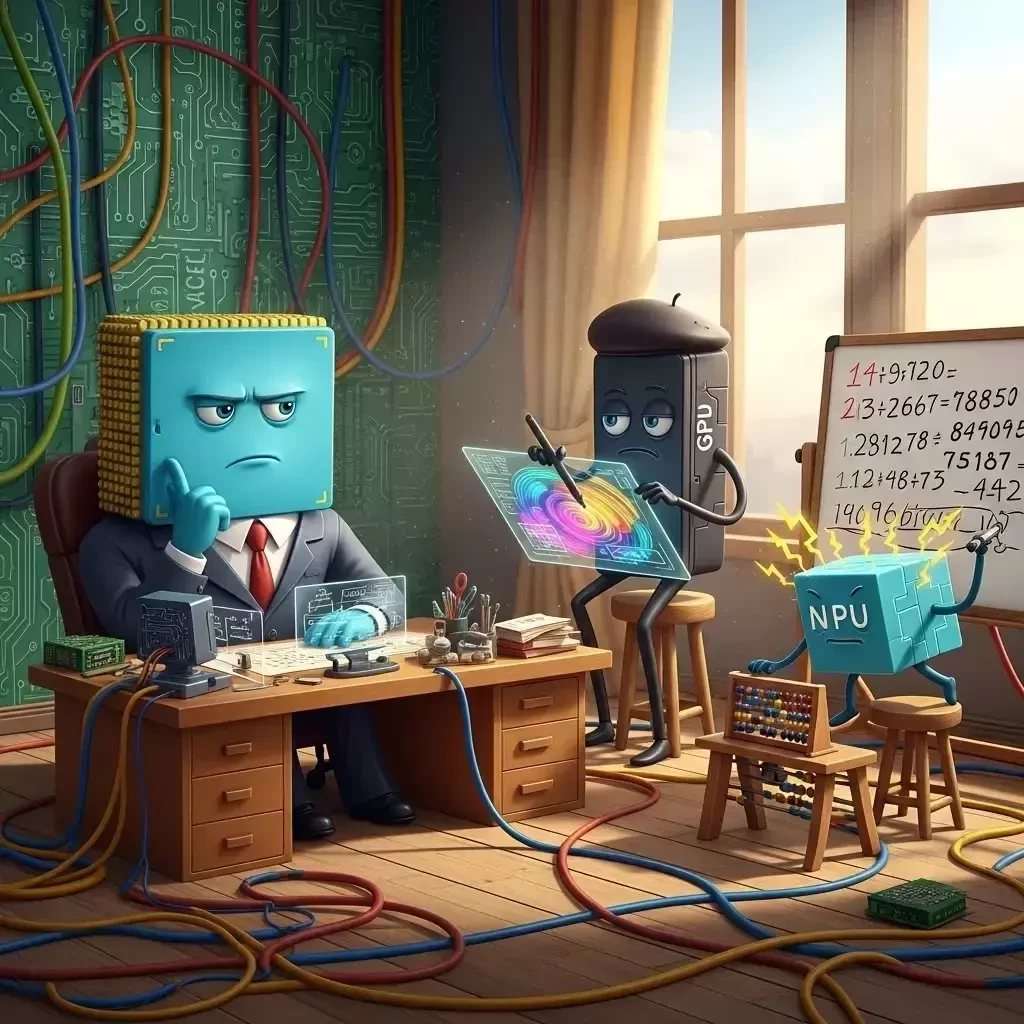Getting Ready for the Era of Desktop AI PCs: why the NPU Isn't Everything Yet. Part 01/06
Welcome! In this series of articles, we will delve into a revolutionary topic that is already changing the approach to choosing and assembling a PC: the AI PC era. Perhaps you thought: "Why do I need another AI in my computer if everything works on the Internet?" This is an absolutely logical question. And the answer to it lies in your competitive advantage, speed, and independence.
In simple terms, AI PC is a personal computer optimized for performing artificial intelligence tasks without a constant Internet connection. This is possible due to the emergence of a new, specialized processor – NPU (Neural Processing Unit).

What is an NPU and why has it become a key component?
Imagine your computer is a huge office. Until recently, the central processor (CPU) was the main manager responsible for all tasks, and the video card (GPU) was the designer.
With the advent of AI tasks such as sorting photos by friends' faces, summarizing a long article, or instantly translating a conversation during a video call, there was a need for a new, highly specialized professional in the office. What would happen to the main manager (CPU) if a lot of such routine tasks "fall" on it? It will "choke," lose focus on important projects, and will not be able to work effectively. That is why the NPU (neural processor) appeared – a "lightning-fast mathematician" who can perform these routine, repetitive tasks without distracting the main manager (CPU) and the designer (GPU) from their main work.
The main advantages of an NPU that make it essential even with cloud services:
independence from circumstances: in a country with risks of power outages and unstable Internet, a regular PC is a risk. An AI PC is your insurance and guarantee of stability, as it performs AI tasks autonomously, without a network connection;
confidentiality: when you use cloud services, your data (even non-"secret" photos or work documents) is sent to third-party servers. With an AI PC, all operations take place on your device, which means your personal information remains only with you;
productivity that saves time: An AI PC with an NPU is a tool that gives you a competitive advantage. Typical tasks such as transcribing a 60-minute conversation, sorting 5,000 photos, or writing document templates are performed in seconds, allowing you to get ahead of those who are still "googling" or sitting in Word;
energy efficiency: NPU processors are specially sharpened for AI loads: they perform operations 20–30 times more energy-efficiently than a CPU or even a GPU (according to manufacturer research). This means that your PC handles generative tasks, consuming as much energy as regular browsing, which is especially important in blackout conditions.
Myth vs. Fact
Myth: "An AI PC is just a marketing name." Fact: An NPU is a separate, physical block in your processor that specifically offloads routine AI tasks from the CPU and GPU.
Myth: "Cloud services are enough for AI tasks." Fact: Cloud services depend on the Internet, can cost money, and your data leaves the device. An AI PC gives you autonomy, confidentiality, and savings.
However, like any highly specialized professional in an office, the NPU cannot work alone. It is important to understand that the AI PC era is just beginning, and the number of programs that fully utilize the NPU is growing every month. Today, these are functions in the Microsoft Windows 11 operating system, the latest versions of spreadsheet and graphics processors, integrated office suites, and video conferencing applications.
For a full-fledged AI PC to function, all of its components must work in harmony. This is what we will talk about in the next part, where you will learn how to build the perfect AI PC without overpaying or losing performance.
